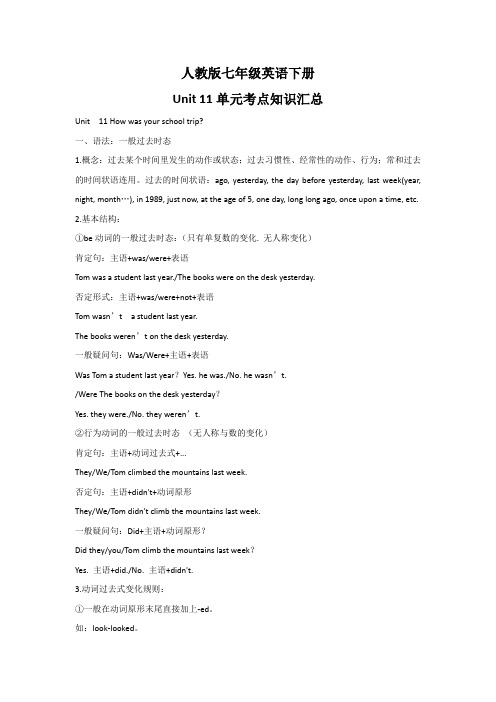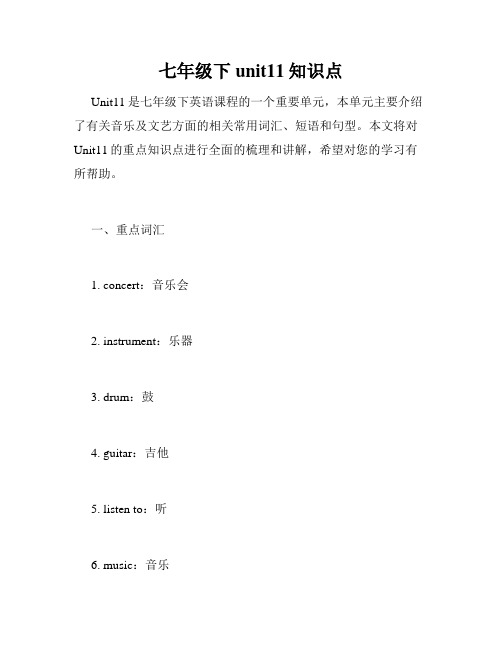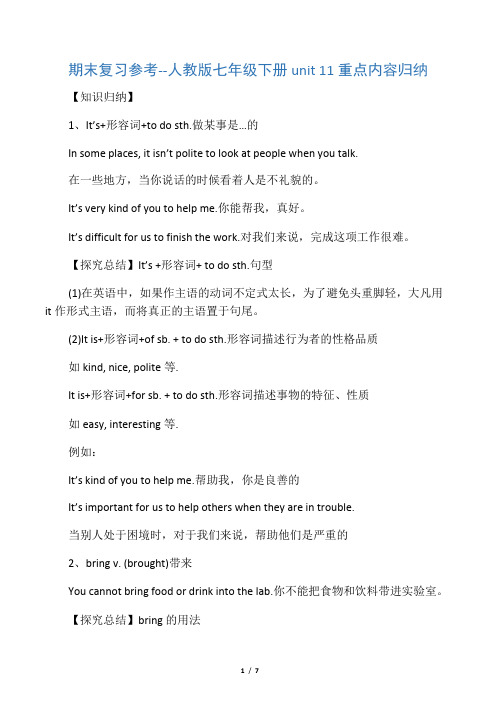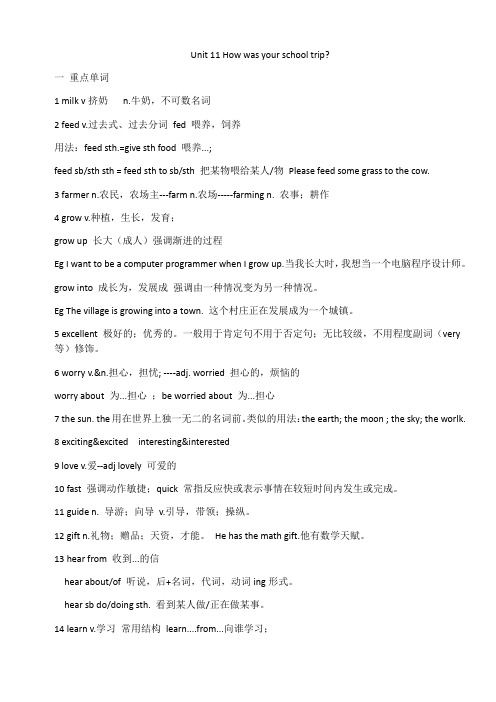最新人教版七年级下册英语Unit11所有知识点、句型精学笔记
人教版七年级英语下册Unit 11单元考点知识汇总

人教版七年级英语下册Unit 11单元考点知识汇总Unit 11 How was your school trip?一、语法:一般过去时态1.概念:过去某个时间里发生的动作或状态;过去习惯性、经常性的动作、行为;常和过去的时间状语连用。
过去的时间状语:ago, yesterday, the day before yesterday, last week(year, night, month…), in 1989, just now, at the age of 5, one day, long long ago, once upon a time, etc.2.基本结构:①be动词的一般过去时态:(只有单复数的变化. 无人称变化)肯定句:主语+was/were+表语Tom was a student last year./The books were on the desk yesterday.否定形式:主语+was/were+not+表语Tom wasn’t a student last year.The books weren’t on the desk yesterday.一般疑问句:Was/Were+主语+表语Was Tom a student last year?Yes. he was./No. he wasn’t./Were The books on the desk yesterday?Yes. they were./No. they weren’t.②行为动词的一般过去时态(无人称与数的变化)肯定句:主语+动词过去式+...They/We/Tom climbed the mountains last week.否定句:主语+didn't+动词原形They/We/Tom didn't climb the mountains last week.一般疑问句:Did+主语+动词原形?Did they/you/Tom climb the mountains last week?Yes. 主语+did./No. 主语+didn't.3.动词过去式变化规则:①一般在动词原形末尾直接加上-ed。
人教版新目标英语七年级下册Unit 11 How was your school trip知识点小结

人教版新目标英语七年级下册Unit 11 How was your school trip?1,一般过去时基本结构:主语+动词过去式+其他;否定形式:①was / were + not; ②在行为动词前加didn't,同时还原动词;一般疑问句:①Was/Were+主语+其他?②Did+主语+动词原形+其他?2,动词过去式规则变化:直接加ed;以不发音e结尾的单词,直接加d;以辅音字母+y结尾的,变y为i加ed;以元音字母+y结尾的,直接加ed;以重读闭音节结尾的,双写最后的辅音字母+ed 不规则变化的动词过去式(见书本最后一页)3,How was your school trip?= what was your school trip like?4,Go for a walk5,Milk a cow6,Ride a horse7,Quite a lot8,Show sb around9,并列谓语的时态和数必须一致。
10,In the countryside11,after that12,come out13,go on school trip14,along the way15,buy/ get sb sth= buy/ get sth for sb16,all in all17,否定转移(主语为第一人称I 或者we时)think,believe,suppose18,be interested in +n/ v-ing19,not at all20,diary entry21,Something意为“某事,有些事”;anything意为“任何事,任何东西”;everything意为“每一件事”(其后的谓语动词要用单数);nothing意为“没事,什么事都没有”。
人教版 英语 七年级下册 11单元知识点笔记

Unit111.一般过去时意义:表示过去某个时间里发生的动作或存在的状态。
结构:v +ed时间标志词:1.yesterday 昨天,the day before yesterday 前天,in the past在过去,just now 刚才st+时间,last week, 上周,last year 去年,last month 上个月3.时间+ago, 3 days ago 三天前,a year ago 一年以前,one hour ago 一小时前4.in+ 过去的年,月。
In 2017, 在2017年动词原形变过去式的变化规则:1)一般情况加ed look----looked play----played2) 以e结尾的,直接加d, live- lived use---used3) 以辅音字母加y结尾的,变y为i, 再加ed, study---studied, worry---worried4) 以辅元辅,重读闭音节结尾的,双写最后一个字母,再加ed, stop—stopped,5)不规则变化,have-had, is—was, are---were, do---did, go- went, come---came,注意:ed的读音,以清辅音加ed的读/t/, 如look—looked /lukt/以浊辅音或元音加ed的读/d/,如live---lived /livd/play—played /pleid/2.过去式变一般疑问句,用Did来引导,后面动词变回原形。
例:I had much homework to do yesterday. --Did you have much homework to do yesterday?过去式变否定句,在动词前加didn’t, 后面动词变回原形。
例:I did my homework just now.--- I didn’t do my homework just now.注意:如果be动词是过去式,变一般疑问句,直接把be动词提前大写,变否定句,直接在be动词后加not, 通常缩写为wasn’t, weren’t.3.Did you…. 的回答:Yes,I did. No, I didn’t.Did she….的回答:Yes, she did. No, she didn’t.Did they….的回答:Yes, they did. No, they didn’t.Was he….的回答:Yes, he was. No, he wasn’t.Were you….的回答:Yes, I was. No, I wasn’t.Were they….的回答:Yes, they were. No, they weren’t.4.Something 和anything 的区别:肯定句用something,否定句或疑问句中用anything.I would like something to drink.I don’t have anything. Is there anything on the desk?用法:1.something, anything叫做复合不定代词,作主语,谓语用单数。
人教版七年级下册 Unit 11知识点总结

七年级下册Unit 11知识点总结第一部分:重点单词1. milk 不可数名词,“牛奶”动词,“挤奶”milk a cow 给奶牛挤奶2. farm 名词,“农场”动词,“务农;种田”farmer 农民3. quite 副词,“相当;完全”修饰形容词副词,quite a lot 相当多拼写注意与quiet(安静的)的区分4. grow “种植”grow strawberries 种草莓动词“生长;发育”grow up 长大“增加;增长”The number of students wearing glasses grows.戴眼镜的学生数量增加了。
5. pick 动词“采摘”pick apples 摘苹果“选择;挑选”pick up “捡起;接电话;接某人“6. worry 动词&名词,“担心;担忧“worry about … 担心… worry sb. 使某人担心7. luckily 副词,“幸运地“unluckily 不幸地lucky 幸运的(形容词)luck 幸运;运气(名词)8. exciting 形容词,“使人兴奋的;令人激动的“excited 感到激动的、兴奋的an exciting message 一个令人激动的消息He is excited to see his old friend.见到老朋友他很激动。
9. expensive 形容词,“昂贵的“cheap ”便宜的“10. slow 形容词,“缓慢的;迟缓的“slowly 缓慢地(副词)fast快地(的)动词,“减慢“slow down 减速慢行11. guide 名词,“导游,向导“动词,“指导“guide sb. to do … 指导某人做某事12. interested 形容词,“感兴趣的“be interested in … 对…感兴趣interesting 有趣的This is an interesting book. 这是一本有趣的书。
七年级下unit11知识点

七年级下unit11知识点Unit11是七年级下英语课程的一个重要单元,本单元主要介绍了有关音乐及文艺方面的相关常用词汇、短语和句型。
本文将对Unit11的重点知识点进行全面的梳理和讲解,希望对您的学习有所帮助。
一、重点词汇1. concert:音乐会2. instrument:乐器3. drum:鼓4. guitar:吉他5. listen to:听6. music:音乐7. musician:音乐家8. opera:歌剧9. orchestra:管弦乐队10. sing:唱歌二、重点短语1. play the guitar:弹吉他2. rock music:摇滚音乐3. classical music:古典音乐4. go to a concert:去听音乐会5. be good at:擅长6. be interested in:对……感兴趣7. be crazy about:热衷于8. learn how to:学会如何……9. have a passion for:热爱三、重点句式1. What kind of music do you like?2. Do you like to sing?3. I'm interested in classical music.4. I'm crazy about rock music.5. He plays the guitar very well.6. She sings beautifully.7. I'm going to learn how to play the piano.8. I have a passion for music.四、常见对话1. A: What kind of music do you like?B: I like pop music.2. A: Do you like to play the guitar?B: Yes, I do. I'm pretty good at it.3. A: Would you like to go to a concert with me tonight?B: That sounds great. What kind of music is it?4. A: I'm interested in classical music. What about you?B: I'm crazy about rock music.五、重点语法本单元所涉及的语法重点主要是一般现在时的运用,包括动词的第三人称单数形式和否定和疑问句的结构。
人教版七年级下册英语 Unit 11 语法知识点精讲(全面!)

人教版七年级下册英语 Unit 11 语法知识点精讲(全面!)11 How was your school trip?知识点大全SA语法:一般过去时一、什么是一般过去时?一般过去时是用于表述“过去”的时态。
1. 表示过去发生的动作。
2. 表示过去发生的状态。
二、一般现在时与一般过去时的共同点一般过去时的句式在结构上与一般现在时的句式结构是完全相同的。
无论是陈述句还是疑问句均是如此。
因而学好了一般现在时的知识,再学习一般过去时的知识是非常容易的。
三、一般现在时与一般过去时的区别。
区别体现在句子的谓语动词上。
因为句子的时态要通过谓语来体现。
而谓语由动词充当。
因此一般过去时中必然要出现用来“体现过去”的谓语动词。
辨析:“过去时”与“过去式”“过去时”是指的句子的时态。
本单元我们研究的是“一般过去时”。
“过去式”是指的动词的过去式,是一种拼写上的形式。
重要说明接下来介绍的一般过去时与一般现在时在陈述句,一般疑问句及特殊疑问句中的关系时所给的例句均不涉及时间状语。
(若加入了时间状语的话情况就更复杂一些,以后慢慢积累即可)语法:一般过去时的陈述句结构与一般现在时陈述句结构的关系一、主系表结构的情况。
1)肯定句。
I am a student.—> I was a student.You are young.—> You were young.I feel well.—> I felt well.She looks good.—> She looked good.2)否定句。
I am not a student.—> I was not a student.You are not young.—> You were not young.特殊说明:含有感官系动词的肯定陈述句在变为疑问句和否定句时需要当做实意动词处理。
这句话的变化例子放在后面实意动词单独作谓语的板块中出现。
总结:此类结构中,将系动词变为其过去式,句子的时态即变成了一般过去时。
人教版七年级下册unit 11单元考点归纳

期末复习参考--人教版七年级下册unit 11重点内容归纳【知识归纳】1、It’s+形容词+to do sth.做某事是…的In some places, it isn’t polite to look at people when you talk.在一些地方,当你说话的时候看着人是不礼貌的。
It’s very kind of you to help me.你能帮我,真好。
It’s difficult for us to finish the work.对我们来说,完成这项工作很难。
【探究总结】It’s +形容词+ to do sth.句型(1)在英语中,如果作主语的动词不定式太长,为了避免头重脚轻,大凡用it作形式主语,而将真正的主语置于句尾。
(2)It is+形容词+of sb. + to do sth.形容词描述行为者的性格品质如kind, nice, polite等.It is+形容词+for sb. + to do sth.形容词描述事物的特征、性质如easy, interesting等.例如:It’s kind of you to help me.帮助我,你是良善的It’s important for us to help others when they are in trouble.当别人处于困境时,对于我们来说,帮助他们是严重的2、bring v. (brought)带来You cannot bring food or drink into the lab.你不能把食物和饮料带进实验室。
【探究总结】bring的用法(1)bring作动词用,意为“带来”,其过去式为brought常构成短语:bring sb. sth. = bring sth. to sb.意为“给某人带来某物”bring up意为“养育”。
(2)bring, take, carry与get的用法辨析:bring表示从别处把某人或物“带来”或“拿来”take指把某人或物“带走”或“拿走”(到别处)carry指“搬运”,不详尽说明来去的方向,有时含有惨重或麻烦之意get指到别处把某物取来,相当于go and bring3、each pron.各个,每个In the US some people shake hands, and some kiss or hug each other.在美国,有些人握手,有些人亲吻或彼此拥抱。
新目标人教版英语七下unit11知识点总结

Unit 11 How was your school trip?一重点单词1 milk v挤奶n.牛奶,不可数名词2 feed v.过去式、过去分词fed 喂养,饲养用法:feed sth.=give sth food 喂养...;feed sb/sth sth = feed sth to sb/sth 把某物喂给某人/物Please feed some grass to the cow.3 farmer n.农民,农场主---farm n.农场-----farming n. 农事;耕作4 grow v.种植,生长,发育;grow up 长大(成人)强调渐进的过程Eg I want to be a computer programmer when I grow up.当我长大时,我想当一个电脑程序设计师。
grow into 成长为,发展成强调由一种情况变为另一种情况。
Eg The village is growing into a town. 这个村庄正在发展成为一个城镇。
5 excellent 极好的;优秀的。
一般用于肯定句不用于否定句;无比较级,不用程度副词(very 等)修饰。
6 worry v.&n.担心,担忧; ----adj. worried 担心的,烦恼的worry about 为...担心;be worried about 为...担心7 the sun. the用在世界上独一无二的名词前。
类似的用法:the earth; the moon ; the sky; the worlk.8 exciting&excited interesting&interested9 love v.爱--adj lovely 可爱的10 fast 强调动作敏捷;quick 常指反应快或表示事情在较短时间内发生或完成。
11 guide n. 导游;向导v.引导,带领;操纵。
- 1、下载文档前请自行甄别文档内容的完整性,平台不提供额外的编辑、内容补充、找答案等附加服务。
- 2、"仅部分预览"的文档,不可在线预览部分如存在完整性等问题,可反馈申请退款(可完整预览的文档不适用该条件!)。
- 3、如文档侵犯您的权益,请联系客服反馈,我们会尽快为您处理(人工客服工作时间:9:00-18:30)。
11.种植草莓_________________12.采草莓___________________13.在乡下___________________14.去钓鱼________________
15.在晚上__________________16.许多;大量________________
17.出来_______________18.学校郊游________________
知ቤተ መጻሕፍቲ ባይዱ点精练
1.Hanhan is a popular writer . His new book will _____ soon .
A . come up B. come in
C . Come outD. come on
24.对...感兴趣________________25.根本不...__________________
知识精练
1.根据句意完成句子
父亲节快到了,我想给父亲买些礼物
Father’s Day is coming . I want to___________________________
2.I am interested ____ sports . I often play soccer and I am ____ a soccer team .
4.I_____(have) dinner with my friends last Sunday.
5.She_____(ask) her teacher some questions yesterday.
要求互检签字___________
知识点:2:固定短语搭配
______________________=_______________________去散步
7相当多;许多_______ _____ ____8带领......参观_______________
9了解___________________
知识精练:
1.Mr.Li gave me too much help this time.(改写同义句)
Mr . Li helped me ______ ______ ______ this time.
21使人兴奋的__________22可爱____________23昂贵的____________
24便宜的______________25缓慢的___________26快的_______
27机器人_______28导游_______29礼物_______30所有事物___________
31感兴趣的_____________32黑暗的_________33听见__________
Eg:He _____ (go) to the zooyesterday.
精练:
1. I____ (feed)chickens on the farm last week.
2. My brother _____ (talk) with a farmer two days ago.
3.Jim ____ (stay) at home last week.
七年级英语unit11精学笔记
精学要求
1.每个例子后面要对子互讲。
2.每一知识点,都要求互检互签,互检在知识点的右侧空白处签上检查人员的名字。
精学笔记
基础知识一单词
1挤奶 ________ 2奶牛_________3马_______4喂养_______
5农民_________6相当,完全_____7任何东西_______
知识点一精炼:
1.—What’s your father’s job?
--He’s a _______(farm).
2.There are some ___ and ___ in the fridge(冰箱)。
A .tomatos ; milk B. tomatos ; milks
C. tomatoes ; milkD. tomatoes ; milks
2.We showed our press cards(采访证)__the old man , and then he showed us _____ his old house happily.
A .to ; toB. with ; around
C . to ; aroundD . with ; to
互检互签__________
基础知识二:短语
1去散步______________2给奶牛挤牛奶______ ____ ______
3骑马_________________4喂鸡__________ _____________
5与......谈话__________________6拍照____________________
______________给奶牛挤奶_______________喂鸡
8种植,生长________9农场_______10采摘________
11极好的;优秀的__________12乡村;农村___________13昨天___________
14花__________15担心________ 16幸运的_______17太阳_________
18火灾_____________19博物馆_________20油画________
2.He _____ last weekend .
A.went fish B. goes fish
C. goes fishingD. went fishing
19.沿着这条路________________
20.之后______________21.为某人买某_________________
22.总的来说__________________23.乘火车______________________
A . in ; in B. in ; on C. at ; in D. at ; on
互检互签_______________
知识点1:一般过去时的用法
表示过去某个时间发生的动作或存在的状态,常和表示过去的时间状语连用.标志词:_________, ___________, _________等,要用动词的过去式。
